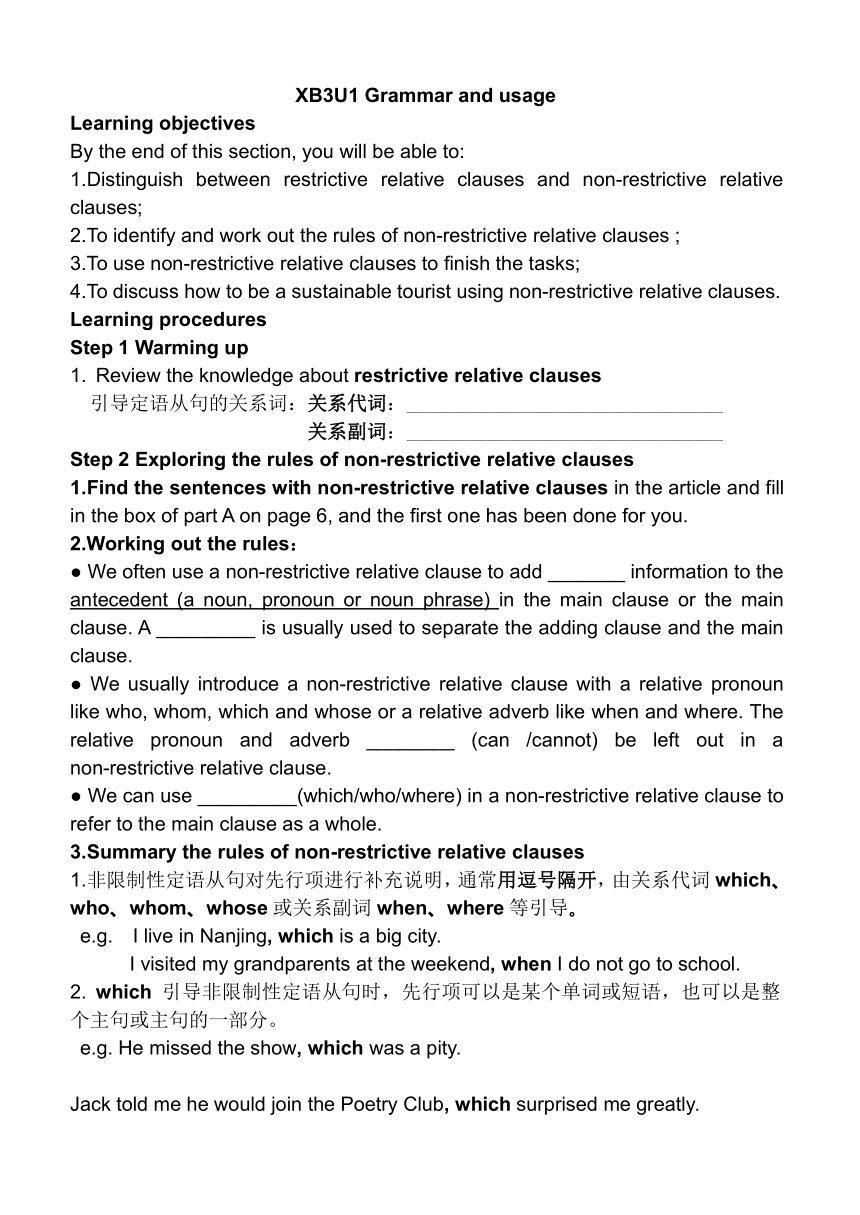
XB3U1 Grammar and usage Learning objectives By the end of this section, you will be able to: 1.Distinguish between restrictive relative clauses and non-restrictive relative clauses; 2.To identify and work out the rules of non-restrictive relative clauses ; 3.To use non-restrictive relative clauses to finish the tasks; 4.To discuss how to be a sustainable tourist using non-restrictive relative clauses. Learning procedures Step 1 Warming up Review the knowledge about restrictive relative clauses 引导定语从句的关系词:关系代词:_____ 关系副词:_____ Step 2 Exploring the rules of non-restrictive relative clauses 1.Find the sentences with non-restrictive relative clauses in the article and fill in the box of part A on page 6, and the first one has been done for you. 2.Working out the rules: ● We often use a non-restrictive relative clause to add _____ information to the antecedent (a noun, pronoun or noun phrase) in the main clause or the main clause. A _____ is usually used to separate the adding clause and the main clause. ● We usually introduce a non-restrictive relative clause with a relative pronoun like who, whom, which and whose or a relative adverb like when and where. The relative pronoun and adverb _____ (can /cannot) be left out in a non-restrictive relative clause. ● We can use _____(which/who/where) in a non-restrictive relative clause to refer to the main clause as a whole. 3.Summary the rules of non-restrictive relative clauses 1.非限制性定语从句对先行项进行补充说明,通常用逗号隔开,由关系代词which、who、whom、whose或关系副词when、where等引导。 e.g. I live in Nanjing, which is a big city. I visited my grandparents at the weekend, when I do not go to school. which 引导非限制性定语从句时,先行项可以是某个单词或短语,也可以是整个主句或主句的一部分。 e.g. He missed the show, which was a pity. Jack told me he would join the Poetry Club, which surprised me greatly. 3.在非限制性定语从句中,whom、which前面可以加some/ many/ all of等修饰词,表示整体中的部分或所有。 e.g. Many people, some of whom are not overweight, are going on a diet. 4.as引导非限制性定语从句时,先行项可以是整个主句或主句的一部分。as引导的从句可以置于主句前、主句中或主句后。 e.g. As is know to all, the Moon travels around the Earth. Step3 Applying the rules: Finish B1 and B2 on page7. Step4 Discussion in pairs: discuss more ways to be a sustainable tourist, using non-restrictive relative clauses. Step5 Consolidation (根据句意填关系词) 1) I live in Nanjing, _____is a big city. 2) I like my English teacher, _____ speaks good English. 3) I visit my grandparents at the weekend, _____ I do not go to school. 4) Many people, some of _____ are not overweight, are going on a diet. 5) John told me he would join the Poetry Club, _____ surprised me greatly. 6) _____ is known to all, the Moon travels around the Earth. 7) The boy was away from home for a week, _____ _____(这使他父母很担心). 8) The fire lasted for a whole night, _____(这造成了极大的破坏). ... ...
~~ 您好,已阅读到文档的结尾了 ~~

